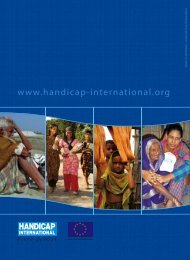Full page photo print - Harvard Law School Project on Disability
Full page photo print - Harvard Law School Project on Disability
Full page photo print - Harvard Law School Project on Disability
You also want an ePaper? Increase the reach of your titles
YUMPU automatically turns print PDFs into web optimized ePapers that Google loves.
ange of approaches taken in prior human rights instruments and places the issues in the<br />
c<strong>on</strong>text of disability. Article 17 (Protecting the integrity of pers<strong>on</strong>s) clearly indicates that people<br />
with disabilities have the right to have their physical and mental integrity respected <strong>on</strong> an equal<br />
basis with others. This language closely mirrors that found in some regi<strong>on</strong>al human rights<br />
instruments, such as Article 5(1) of the inter-american C<strong>on</strong>venti<strong>on</strong> <strong>on</strong> human rights, 9<br />
which appears in that c<strong>on</strong>venti<strong>on</strong>’s secti<strong>on</strong> <strong>on</strong> “right to humane treatment.”<br />
Issues of privacy in the CRPD are dealt with almost exclusively in Article 22 (Respect for<br />
Privacy), which protects people with disabilities from “arbitrary or unlawful interference with his<br />
or her privacy, family, home or corresp<strong>on</strong>dence or other types of communicati<strong>on</strong>,” as well as<br />
from unlawful attacks <strong>on</strong> “h<strong>on</strong>or or reputati<strong>on</strong>.” The Article does not, for example, prevent the<br />
police from carrying out a valid search of a disabled pers<strong>on</strong>’s bel<strong>on</strong>gings, but it would prevent<br />
other types of searches or surveillance that are arbitrary or unlawful. In order to emphasize<br />
the importance of the right even in places such as instituti<strong>on</strong>s, where people with disabilities<br />
have historically experienced many violati<strong>on</strong>s of privacy, Article 22 expressly states that these<br />
protecti<strong>on</strong>s extend regardless of “place of residence or living arrangements.”<br />
Also noteworthy is the Article’s reference to “other types of communicati<strong>on</strong>,” which was<br />
intended by drafters to update the more traditi<strong>on</strong>al reference to “corresp<strong>on</strong>dence.” Some<br />
drafters felt that “corresp<strong>on</strong>dence” was too str<strong>on</strong>gly c<strong>on</strong>nected to letters, and that there was<br />
a need to ensure that e-mail, text messaging, and other more modern and future forms of<br />
communicati<strong>on</strong> would be covered by the C<strong>on</strong>venti<strong>on</strong>. Lastly, Article 22 emphasizes the right of<br />
people with disabilities to have their pers<strong>on</strong>al, health, and rehabilitati<strong>on</strong> informati<strong>on</strong> protected<br />
<strong>on</strong> an equal basis with others. This c<strong>on</strong>cept is reflected again in Article 31(1)(a) (Statistics and<br />
data collecti<strong>on</strong>), which requires States to “ensure c<strong>on</strong>fidentiality and respect for the privacy of<br />
pers<strong>on</strong>s with disabilities” when collecting and maintaining statistics and data.<br />
The right to respect for home and the family is addressed at some length in Article 23 of the<br />
CRPD. Because of the historic discriminati<strong>on</strong> against people with disabilities in the areas of<br />
marriage, family, parenthood, and relati<strong>on</strong>ships, Article 23 addresses each of these in some<br />
detail. Specifically:<br />
• Article 23(1)(a) protects the right of people with disabilities to marry with the free and<br />
full c<strong>on</strong>sent of each pers<strong>on</strong>, and to found a family.<br />
• Article 23(1)(b) protects the rights of people with disabilities to make their own<br />
decisi<strong>on</strong>s regarding when and how many children to have. It also ensures access to<br />
“age appropriate” informati<strong>on</strong> and “reproductive and family planning educati<strong>on</strong>,” so<br />
that people with disabilities can make informed decisi<strong>on</strong>s in these matters.<br />
• Article 23(1)(c) addresses the right of people with disabilities, including children, to<br />
“retain their fertility <strong>on</strong> an equal basis with others.” This provisi<strong>on</strong> not <strong>on</strong>ly protects<br />
against forced sterilizati<strong>on</strong> of children and adults with disabilities, but also implicates<br />
the right of people with disabilities to have access to health care, nutriti<strong>on</strong>, and other<br />
factors that are pre-c<strong>on</strong>diti<strong>on</strong>s to retaining fertility.<br />
• Article 23(2) ensures that people with disabilities have the right to be guardians,<br />
trustees, adoptive parents, or the like, wherever such rights also exist for other<br />
people. In other words, people with disabilities should not be prevented from being<br />
guardians, trustees, or adoptive parents because they are people with disabilities.<br />
Furthermore, States must provide “appropriate assistance” to parents with disabilities,<br />
should they need such assistance to perform their child-rearing resp<strong>on</strong>sibilities.<br />
9 See http://www1.umn.edu/humanrts/oasinstr/zoas3c<strong>on</strong>.htm<br />
104 human rights. yes! aCtiOn and adVOCaCy On the rights Of persOns with disabilities




